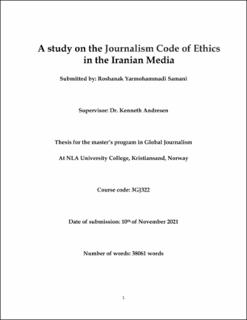| dc.description.abstract | Since the early 20s, journalism was approved as a profession, and a set of norms, ethical values, and quality standards were defined for journalistic practice. As discussed by Day (2005) to build trust, and improve the moral ecology in the society, it is necessary to rely on an ethical system (p.50). In this regard, the fundamental ethical principles, such as truthfulness, accuracy, objectivity, impartiality, fairness, and accountability should be considered by the media to be credible to the public.
However, journalism ethics was not observed by all media around the world in the same way. Hence, defining a universal code of ethics for journalism became a controversial debate among media scholars. While some theorists believe that a universal ethical code should be defined for journalism, others present the opposite views. As they mentioned, due to the differences between cultures, historical, political, and societal of the countries, it is not possible to arrange a universal code of ethics for all media around the world.
Since the general objective of this study is to analyze the situation of media ethics in the Iranian media, the correspondence of ethical codes in the Iranian media houses with the international codes of ethics for journalism, and the challenges that Iranian journalists face adhering to media ethics, I arranged two research questions:
RQ1: Which professional codes of ethics are in function in the Iranian media?
RQ2: To what extent are Iranian journalists able to practice ethical codes?
To gather data, and find the answers to the research questions, I interviewed 10 Iranian journalists. All interviews were recorded, transcribed, and then translated from Persian to English. After codifying the answers, I analyzed the data. The key findings of this research were aligned with the related theories; thus, they could answer my research questions properly.
In a brief overview, the main findings revealed that journalism in Iran is far from professional journalism, since most journalists in Iran are not professionals, and they do not have the qualifications of professionals such as related education, autonomy, independence, moral values, working full time for a media and getting monthly payment.
Furthermore, interviews show that there is no defined united or local code of ethics for journalism in Iran, and every media house applies its policies for journalistic practice, which are not necessarily based on media ethics. Furthermore, the ethical codes, which are applicable for journalism in Iran are not compatible with a universal code of ethics for journalism.
Regarding adherence to media ethics, as interviewees pointed out, the Iranian media face many problems, such as a lack of professional journalism, the political and economic dependence on the state, the absence of legal enforcement to support media ethics, and many restrictions on the media made by the government or authorities. Due to these issues, there is no expectation to improve media ethics in the recent situation in Iran.
Since there is no proper study on journalism ethics in Iran, and there is not enough information to evaluate the extent to adhere to media ethics in the Iranian media, this study would broaden the reader’s horizon about journalism ethics in the Iranian media ecology. | en_US |
